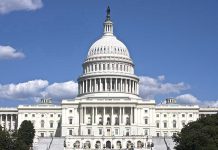
The VA’s termination of union contracts threatens the rights of its employees, as the administration justifies this controversial move in the name of reform.
Story Overview
- VA Secretary Doug Collins terminates union contracts, citing harm to veterans’ interests.
- The decision affects nearly 320,000–425,000 VA employees.
- Unions, including AFGE, condemn the action as a political attack.
- President Trump’s executive order paves the way for the contract terminations.
Termination of Union Contracts at VA
In August 2025, VA Secretary Doug Collins announced the termination of union contracts covering most Department of Veterans Affairs (VA) employees. This move, affecting nearly 320,000–425,000 workers, was justified by Collins as necessary to address inefficiencies and protect veterans’ interests. The Secretary accused unions of shielding underperforming workers and obstructing reforms. This action follows a March 2025 executive order from President Trump that restricted federal labor-management relations.
Major unions, including the American Federation of Government Employees (AFGE), have condemned the terminations as a political attack and retaliation for previous opposition to VA policies. They argue that this measure undermines worker rights and could adversely affect the quality of care provided to veterans. Unions have traditionally played a crucial role in advocating for employee rights, workplace safety, and fair labor practices within the VA.
Impact on Veterans and Employees
The termination of union contracts is expected to have significant short-term and long-term implications. In the short term, VA employees will lose collective bargaining rights, potentially leading to increased disciplinary actions and reductions in workforce. This move has already sparked labor unrest and may result in legal challenges as unions mobilize against the decision. The impact on veteran care remains a concern, with critics warning of potential declines in service quality due to reduced employee morale and retention.
In the long term, the restructuring of workforce management at the VA could influence broader federal labor relations, potentially setting a precedent for other agencies. The economic implications include potential cost savings from workforce reductions, although service disruptions remain a risk. Socially, the decline in workplace protections and morale could negatively affect the quality of care for veterans who rely on VA services.
Political and Social Reactions
The political landscape surrounding this decision is highly charged. While VA leadership and the administration justify the move as a necessary reform to improve efficiency and accountability, opponents view it as a politically motivated attack on labor rights. The decision has intensified the ongoing partisan debate over labor rights and public sector reform, with lawmakers divided on the issue. Some support the VA’s reforms, while others, led by Senator Mazie Hirono, have urged exemptions for VA employees, warning of harm to veterans and workforce morale.
As the VA proceeds with its reforms, the long-term effects on veteran care and workforce stability remain uncertain. The situation continues to develop, with unions seeking legal and political avenues to challenge the contract terminations. This issue highlights the broader tensions between federal labor policy and public sector unions, with significant implications for the future of labor relations in government agencies.
Sources:
The Daily Signal: Veterans Affairs cuts ties with unions
Senate Press Release: Hirono and colleagues demand Collins exempt VA employees from executive order
VA News: VA Secretary addresses benefits rumors


















